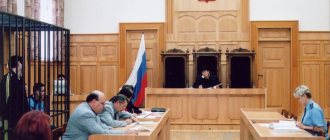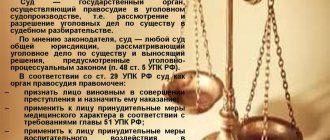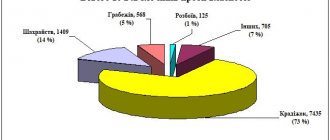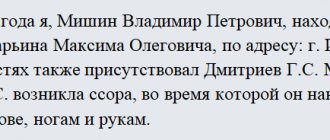Concept and classification of participants in criminal proceedings
A significant number of government bodies, officials, public associations and citizens are involved in the field of criminal procedural activity. They participate in criminal proceedings and have certain rights and responsibilities.
The Code of Criminal Procedure uses the concept of “participants” to designate them (clause 58 of Article 5), and to classify them – the concept of “party” and such a criterion as the function performed by a participant in the process. In Art. 5 and in Sect. II Code of Criminal Procedure, all participants in the process are divided into the following groups: 1) court (carries out the function of resolving the case); 2) participants in the process on the part of the prosecution (these are those persons who carry out or participate in the implementation of the function of criminal prosecution); 3) participants in the process on the part of the defense (performing the same function) and 4) other participants in criminal proceedings (they participate in evidence or perform an auxiliary role).
Some important points
It is important to understand that criminal law protects not only public relations, that is, it is public, but also private rights and private interests. Well, look. There is terrorism. It is clear that there is a public interest here - the safety of society. But the lives of specific people are their right to life. Terrorists violate these rights, which means they encroach on private interests.
So, in any criminal case there are four possible options for combining private and public interest. At the same time, the prosecutor acts on the side of protecting public relations. And on the side of private relations, there is a private prosecutor. And in theory, if the court comes to the conclusion that only private interests have been violated, then the prosecutor is removed from the case and the case can be dropped.
So the options:
- The first option is when both public and private interests are violated. For example, cases of theft and theft. Here, of course, damage has been caused to the institution of private property, but the property of the victim itself - his property rights - is his personal interest. In such a case, the public prosecutor will play the main role, and the private prosecutor will have a place to be.
- The second option, in which damage is caused only to public interest. For example, these could be cases involving illegal financial and economic transactions, theft of money from the country's budget, etc. There is not and cannot be a private prosecutor.
- Third option. In such cases, only private interests are violated. For example, this is a case of beating, causing harm to the health of another person due to beatings, etc. The prosecutor is not involved here, but only a private prosecutor.
- The fourth option is when private rights and interests are violated, but the prosecutor gets involved in the case.
I think now the role of each participant in the criminal process has become clear to you.
Your task is to write in the comments examples of criminal cases for all four options for the relationship between public and private interests with references to the Criminal Code of the Russian Federation. Share on social media networks
Court in the system of subjects of criminal proceedings
The exclusive competence of the court is the administration of justice. Only a court has the authority to find a person guilty of committing a crime and impose a punishment on him or apply compulsory medical measures to the person (Article 29 of the Criminal Procedure Code).
All previous pre-trial activities are carried out in order to ensure the possibility of consideration of the case by the court. The materials of pre-trial proceedings and the conclusions of the investigator and interrogating officer have only preliminary significance for the court. The activities of the court are not limited to checking the materials of the preliminary investigation; they are independent in nature. The conclusions of the investigator and the inquiry officer and the results of their assessment of the evidence do not bind the court. Only the evidence that was considered at the trial can be used to support the verdict.
The Code of Criminal Procedure gives the court a number of powers in pre-trial proceedings (Part 2 of Article 29). In particular, the court decides
- on the application of preventive measures in the form of detention, house arrest, bail;
- extension of the period of detention;
- placement of the suspect and accused in a medical or psychiatric hospital for examination;
- inspection of a home without the consent of the persons living there;
- conducting a search and seizure of a home;
- conducting a personal search, except in cases of a personal search during the detention of a suspect;
- seizing items and documents containing state or other secrets protected by federal law, as well as items and documents containing information about deposits and accounts of citizens in banks and other credit organizations;
- seizure of correspondence and its seizure;
- seizure of property;
- temporary removal of a suspect or accused from office;
- monitoring and recording telephone and other conversations.
Participants in criminal proceedings on the part of the prosecution
This group of participants in the criminal process of the Criminal Procedure Code includes the following persons and bodies: prosecutor, investigator, head of the investigative body, inquiry body, head of the inquiry unit, investigator, private prosecutor, victim, civil plaintiff, their legal representatives and representatives.
Participants in criminal proceedings on the part of the prosecution are either charged with the responsibility of performing the function of criminal prosecution, or they have the right to take part in criminal prosecution. Thus, the goals and objectives of their activities are the same. But this does not mean that the methods and conditions for carrying out this activity are the same. Each of the participants in this group uses special procedural means and is endowed with a different range of procedural rights and obligations.
Prosecutor
(Article 37 of the Criminal Procedure Code) in criminal proceedings performs two interrelated functions: carries out criminal prosecution and supervises the procedural activities of the preliminary investigation bodies. However, the prosecutor retained administrative powers when carrying out supervisory activities only in relation to the investigator. In relation to the investigator, similar powers of the prosecutor were transferred to the head of the investigative body. In addition, the Code of Criminal Procedure significantly limited the powers of the prosecutor to participate in criminal prosecution during pre-trial proceedings.
During pre-trial proceedings, the prosecutor is authorized to:
- check compliance with the law when receiving, registering and resolving reports of crimes;
- make a decision on sending materials to the investigative body or inquiry body for criminal prosecution on the facts of violations identified by the prosecutor;
- demand from the bodies of inquiry and investigative bodies the elimination of violations of the law committed during the inquiry or preliminary investigation;
- give the investigator written instructions on the direction of the investigation and the conduct of procedural actions;
- give consent to the investigator to initiate a petition before the court to select, cancel or change a preventive measure or to perform another procedural action that is permitted on the basis of a court decision;
- cancel illegal or unfounded decisions of a lower-ranking prosecutor and investigator;
- consider the investigator’s information about disagreement with the prosecutor’s demands presented by the head of the investigative body and make a decision on it;
- participate in court hearings when considering during pre-trial proceedings issues on the selection of a preventive measure in the form of detention, on extending the period of detention or on the abolition or change of this preventive measure, as well as when considering petitions for other procedural actions that are allowed in the basis of a court decision, and when considering complaints;
- allow challenges filed to the investigator, as well as his self-recusations;
- remove the investigator from further investigation if he violates the requirements of the Code of Criminal Procedure;
- withdraw any criminal case from the investigative agency and transfer it to the investigator with the obligatory indication of the grounds for such transfer;
- transfer criminal cases from one preliminary investigation body to another, withdraw any criminal case from the preliminary investigation body of the federal executive body and transfer it to an investigator of the Investigative Committee at the Prosecutor's Office of the Russian Federation;
- approve the decision of the investigator to terminate the criminal proceedings;
- approve an indictment or indictment in a criminal case;
- return the criminal case to the inquirer or investigator with written instructions to conduct an additional investigation, to change the scope of the charges or qualifications of the actions of the accused, or to re-draft the indictment or indictment and eliminate identified deficiencies.
In court, the prosecutor supports the state prosecution.
Investigator
(Article 38 of the Criminal Procedure Code) is an official authorized, within the limits of his competence, to carry out a preliminary investigation in a criminal case.
The guiding principle in the activities of the investigator is a comprehensive, complete and objective study of the circumstances of the criminal case. The Criminal Procedure Code obliges the investigator to conduct the investigation quickly, actively, and purposefully. The progress and results of the trial largely depend on the quality of the preliminary investigation, since mistakes made by the investigator often lead to irreparable loss of evidence.
The investigator independently makes decisions on initiating a criminal case, accepting a criminal case for his own proceedings, or transferring it to the head of the investigative body for referral according to jurisdiction; on the conduct of investigative and other procedural actions, except for cases when, in accordance with the Code of Criminal Procedure, it is necessary to obtain a court decision or the consent of the head of the investigative body.
Written instructions from the investigator on conducting operational-search activities, carrying out certain investigative actions, on executing decisions on detention, arrest, arrest, and on carrying out other procedural actions are mandatory for their execution by the body of inquiry.
The investigator has the right to appeal, with the consent of the head of the investigative body, the prosecutor's decision to return the criminal case for additional investigation, change the scope of the charge or classify the actions of the accused, or re-draft the indictment and eliminate identified deficiencies.
If you disagree with the prosecutor's demands to eliminate violations of federal legislation committed during the preliminary investigation, the investigator is obliged to submit his written objections to the head of the investigative body, who informs the prosecutor about this.
Head of the investigative body
- this is the official heading the relevant investigative unit, as well as his deputy. He monitors the timeliness of the investigator’s actions to investigate crimes, takes measures to increase the efficiency of the investigation and avoid red tape.
In accordance with Art. 39 of the Criminal Procedure Code, the head of the investigative body is vested with the following powers:
- entrust the conduct of the preliminary investigation to an investigator or several investigators, as well as withdraw the criminal case from the investigator and transfer it to another investigator or accept the criminal case for its own proceedings;
- check the materials of the criminal case, cancel illegal or unfounded decisions of the investigator;
- give the investigator instructions on the direction of the investigation, the performance of certain investigative actions, the imposition of a person as an accused, the selection of a preventive measure against the suspect, the accused, the qualification of the crime and the scope of the charge;
- give consent to the investigator to initiate a petition before the court for the election, extension, cancellation or change of a preventive measure;
- allow challenges filed to the investigator, as well as his self-recusations;
- remove the investigator from further investigation;
- cancel illegal or unfounded decisions of a lower-ranking head of an investigative body;
- extend the period of preliminary investigation;
- approve the investigator's decision to terminate criminal proceedings;
- give consent to the investigator who conducted the preliminary investigation in a criminal case to appeal the prosecutor’s decision;
- return the criminal case to the investigator with his instructions to conduct an additional investigation.
The instructions of the head of the investigative body in a criminal case are mandatory for execution by the investigator, with the exception of cases where the head of the investigative body or the investigator disagrees with the demands of the prosecutor to eliminate violations of federal legislation committed during the preliminary investigation. In this case, the prosecutor has the right to apply to the head of a higher investigative body with a demand to eliminate these violations.
Investigation body, head of the investigation unit, investigator
(Articles 40, 40.1, 41 of the Criminal Procedure Code). The bodies of inquiry include:
- internal affairs bodies and other executive authorities vested with powers to carry out operational investigative activities;
- chief bailiff of the Russian Federation, chief military bailiff, chief bailiff of a constituent entity of the Russian Federation, their deputies, senior bailiffs of the Constitutional, Supreme and Supreme Arbitration Courts;
- commanders of military units, formations, heads of military institutions or garrisons;
- bodies of state fire supervision of the federal fire service.
The bodies of inquiry are entrusted with carrying out operational investigative activities, taking measures to detect crimes, identify the persons who committed them, and suppress and prevent crimes. In addition, the law gives the inquiry authorities the right to conduct an investigation in the form of an inquiry. At the same time, the competence of the inquiry authorities to investigate a criminal case depends on whether a preliminary investigation is required. If a preliminary investigation in the case is not necessary, the investigative body carries out pre-trial proceedings in the case in full and sends the case to court. If, in accordance with the Code of Criminal Procedure, a preliminary investigation is required in a case, then the investigative body has the right to carry out only urgent investigative actions on it, and then is obliged to transfer the case to the investigator.
In the latter case, the powers of the inquiry body are also exercised
- captains of sea and river vessels on long voyages, if the crime was committed on the vessel;
- heads of geological exploration parties and wintering camps remote from the location of the investigative agency, if the crime was committed at the location of the party and wintering camp;
- heads of diplomatic and consular institutions of the Russian Federation, if the crime was committed within these institutions.
The law names an institution or a person at the head of an institution authorized to conduct an inquiry as an investigative body. The actual conduct of the inquiry in a specific case is entrusted by the head of the inquiry body to the investigator.
The investigator is authorized to independently carry out investigative and other procedural actions and make decisions, except in cases where the consent of the head of the inquiry body, the consent of the prosecutor and (or) a court decision is required (Part 3 of Article 41 of the Criminal Procedure Code). The instructions of the prosecutor and the head of the inquiry body are mandatory for the investigator. Their appeal never suspends their execution.
Head of the investigation department
organizes the work of the cognitive unit, instructs subordinate investigators to check reports of a crime, resolve issues regarding the initiation of criminal cases and carry out urgent investigative actions on them, or conduct an inquiry in full. The head of the inquiry unit has the right to check the materials of criminal cases being processed by the investigators subordinate to him, give instructions on the direction of the inquiry, on the conduct of procedural actions, on the selection of a preventive measure against the suspect, on the qualification of the crime and the scope of the charge, to seize the criminal case from one investigator and transfer it another, to cancel the unfounded decisions of the investigator to suspend the proceedings in the case and to submit to the prosecutor proposals to cancel the illegal decisions of the investigator to initiate a criminal case.
The head of the investigation unit has the right to initiate a criminal case, accept it for his proceedings, and conduct a full investigation.
To the victims
(Article 42 of the Criminal Procedure Code) is an individual to whom physical, property, or moral harm has been caused by a crime, as well as a legal entity if the crime causes damage to its property and business reputation. The decision to recognize a victim as a victim is formalized by a resolution of the inquiry officer, investigator or court.
The victim has the right:
- know about the charges against the accused;
- give evidence;
- refuse to testify against yourself or your close relatives;
- present evidence, file motions and challenges;
- use the help of a translator for free;
- have a representative;
- participate, with the permission of the investigator (inquiry officer), in investigative actions carried out at his request;
- get acquainted with the protocols of investigative actions carried out with his participation;
- get acquainted with the decision on the appointment of the examination and the expert’s conclusion;
- at the end of the preliminary investigation, get acquainted with all the materials of the case, write out any information from it in any volume, make copies of the case materials. When several victims participate in a case, each person becomes familiar with the case only in the part related to the harm caused to him;
- receive copies of decisions to initiate a case, recognize it as a victim, terminate or suspend proceedings in the case, copies of the verdict and decisions of higher courts;
- participate in legal proceedings in the courts of the first, second and supervisory instances;
- speak in court debates;
- support the accusation;
- get acquainted with the minutes of the court session and bring comments to it;
- file complaints against the actions and decisions of the inquiry officer, investigator, prosecutor and court;
- appeal court decisions;
- know about the complaints and submissions brought in the case and file objections to them;
- apply for the application of security measures for yourself and your loved ones;
- exercise other powers provided for by the Code of Criminal Procedure.
The victim is provided with compensation for the damage caused by the crime and expenses incurred in connection with his participation in the preliminary investigation and trial, including the costs of a representative.
The victim has no right:
- evade appearing when summoned by an inquiry officer, investigator or to court;
- knowingly give false testimony or avoid giving testimony;
- disclose preliminary investigation data.
If the victim fails to appear without good reason, he may be subjected to forced transportation.
For refusal to testify and for giving knowingly false testimony, the victim is liable under Art. 307, 308 of the Criminal Code; for disclosure of preliminary investigation data - under Art. 310 of the Criminal Code.
In cases of crimes that resulted in the death of the victim, his rights are transferred to one of his close relatives.
If a legal entity is recognized as a victim, its rights are exercised by a representative.
Participation in the case of the legal representative and representative of the victim does not deprive him of the rights provided for by the Code of Criminal Procedure.
Private prosecutor
(Article 43 of the Criminal Procedure Code) is a person who filed an application (complaint) in a criminal case of private prosecution and supports the prosecution in court.
A private prosecutor has the following rights:
- familiarize yourself with the case materials and prepare to participate in the trial;
- present evidence and participate in its research;
- express to the court his opinion on the merits of the charges and other issues arising during the trial, make proposals on the application of the criminal law and the sentencing of the defendant;
- bring and maintain a civil claim;
- drop the charges and make peace with the defendant.
Civil plaintiff
(Article 44 of the Criminal Procedure Code) is an individual or legal entity who has filed a claim for compensation for property damage, if there is reason to believe that this damage was caused to him directly by a crime. The decision to recognize a person as a civil plaintiff is formalized by a court ruling or a decision of a judge, investigator, or inquirer. A civil plaintiff can also file a civil claim for property compensation for moral damage.
A civil claim is brought after the initiation of a criminal case until the end of the judicial investigation. The plaintiff is exempt from paying state fees.
A civil claim in defense of the interests of a minor or other persons who cannot defend their own interests, or in the interests of the state, may be brought by the legal representatives of these persons or by the prosecutor.
A civil plaintiff has the right:
- support a civil claim;
- present evidence;
- give explanations regarding the claim;
- file petitions and challenges;
- give explanations in the language you speak and use the help of a translator for free;
- refuse to testify against yourself and your close relatives;
- have a representative;
- get acquainted with the protocols of investigative actions carried out with his participation;
- participate, with the permission of the investigator (inquiry officer), in investigative actions carried out at his request;
- abandon the civil claim brought against them. Before accepting a waiver of a civil claim, the inquirer, investigator, or court explains to the civil plaintiff the consequences of abandoning a civil claim;
- at the end of the investigation, familiarize yourself with the case materials related to the stated claim and write out any information in any volume from the case;
- know about decisions made that affect his interests and receive copies of procedural decisions related to pussy;
- participate in legal proceedings in the courts of the first, second and supervisory instances;
- speak in court debates, get acquainted with the minutes of the court session and bring comments to it;
- file complaints against the actions and decisions of the inquiry officer, investigator, prosecutor and court;
- appeal court decisions regarding a civil claim;
- know about the complaints and submissions brought in the case and file objections to them.
A waiver of the claim may be declared at any time during the proceedings before the court retires to the deliberation room.
A civil plaintiff has no right
disclose the data of the preliminary investigation if he was warned about it in advance. For the disclosure of such data, the civil plaintiff is liable under Art. 310 of the Criminal Code.
Representatives of the victim, civil plaintiff and private prosecutor
(Article 45 of the Criminal Procedure Code) may be lawyers, and representatives of a civil plaintiff, who is a legal entity, may be other persons authorized to represent his interests. By decision of the magistrate, one of the close relatives or another person may also be admitted as a representative of the victim and civil plaintiff.
If the victim is a minor or, due to his physical or mental condition, cannot independently defend his rights and interests, then the participation of his legal representative or representative in the case is mandatory.
The legal representatives and representatives of the victim, civil plaintiff and private prosecutor have the same procedural rights as the persons they represent.
Personal participation in the case of the victim, civil plaintiff and private prosecutor does not deprive them of the right to have a representative in this case.
Defense side
In criminal proceedings, the defense is represented by:
- suspect;
- accused;
- legal representative of the minor accused;
- defender;
- civil defendant.
A suspect is a person who has been detained pending charges and against whom a criminal case has been initiated. If evidence is collected in relation to this subject of criminal proceedings confirming his guilt in committing a crime, he will become an accused.
In accordance with the Code of Criminal Procedure of the Russian Federation, the suspect has the right:
- know what he is suspected of;
- testify about the suspicion against him or refuse to testify;
- be interrogated no later than 24 hours from the moment of actual detention;
- notify one of the relatives about the fact of detention;
- use the assistance of a defense lawyer and meet with him confidentially before the first interrogation;
- protect yourself by all means and methods not prohibited by law.
An accused in whose criminal case a trial has been scheduled is called a defendant. And the accused, against whom a guilty verdict is passed, is convicted; if the verdict is acquitted, he is acquitted.
The legal representative of a minor suspect or accused may be one of his parents, adoptive parents, guardians or a representative of the institution in whose care the teenager is.
A defense attorney is a person who, in accordance with the procedure established by law, protects the rights and interests of a suspect or accused and provides him with legal assistance in criminal proceedings. The defense attorney helps to identify circumstances that justify the suspect or accused, mitigate his responsibility or relieve him from punishment.
The participation of a lawyer in legal proceedings is one of the important criminal procedural guarantees of respect for the rights and legitimate interests of the accused (suspect).
Civil defendant - an individual or legal entity who is responsible for harm caused by a crime, in accordance with the Civil Code of the Russian Federation. We have already completed coursework
Coursework. Civil law in more detail.








